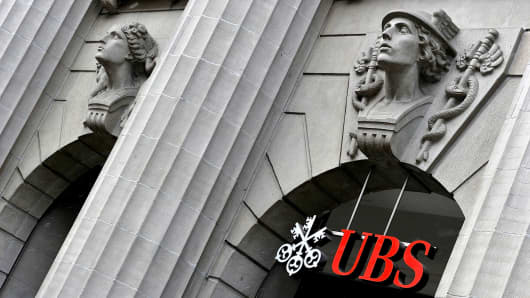UBS saw weak client inflows at its flagship private bank in the fourth quarter as it reported a hefty net loss due to a $1.5 billion fine for rigging benchmark interest rates and restructuring costs.
Switzerland's biggest bank announced plans in October to fire 10,000 staff as it focuses on wealth management and ditches much of the trading business that ran up $50 billion in losses in the financial crisis and prompted the rate rigging fine.
But the wealth management business that is now the key to its future success only delivered 2.4 billion francs in fresh client money -- a key bellwether for future revenue -- clearly missing average analyst forecasts for 6.8 billion francs.
While inflows in fast-growing markets like Asia were healthy, withdrawals by clients in western Europe - where Switzerland is under fire for helping tax cheats - sped up towards the end of the quarter, UBS said.
Chief financial officer Tom Naratil said Germany's rejection mid-December of a tax deal with Switzerland had contributed to the outflows.
However, the wealth management Americas business saw net new money of $8.8 billion, its highest rate of fourth-quarter inflows since 2007 and double analyst forecasts.
"Despite the lack of progress on certain bilateral tax treaties, we remain confident that our asset-gathering businesses as a whole will continue to attract net new money," UBS said in its outlook statement.
UBS has warned it could lose 12-30 billion Swiss francs from total European assets under management of over 300 billion as a result of steps to stop foreigners using secret accounts to evade taxes.
Cutting Risk, Bonuses
UBS reported a 1.89 billion franc loss in the fourth quarter largely due to the fine it agreed in December for rigging Libor and other benchmark interest rates and charges from its restructuring plan to shed 10,000 staff.


